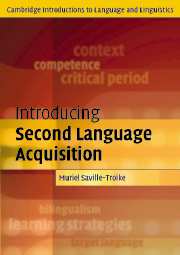Book contents
- Frontmatter
- Contents
- About the book
- Acknowledgments
- 1 Introducing Second Language Acquisition
- 2 Foundations of Second Language Acquisition
- 3 The linguistics of Second Language Acquisition
- 4 The psychology of Second Language Acquisition
- 5 Social contexts of Second Language Acquisition
- 6 Acquiring knowledge for L2 use
- 7 L2 learning and teaching
- Answer guide to questions for self-study
- Glossary
- References
- Index
4 - The psychology of Second Language Acquisition
- Frontmatter
- Contents
- About the book
- Acknowledgments
- 1 Introducing Second Language Acquisition
- 2 Foundations of Second Language Acquisition
- 3 The linguistics of Second Language Acquisition
- 4 The psychology of Second Language Acquisition
- 5 Social contexts of Second Language Acquisition
- 6 Acquiring knowledge for L2 use
- 7 L2 learning and teaching
- Answer guide to questions for self-study
- Glossary
- References
- Index
Summary
CHAPTER PREVIEW
In this chapter we survey several approaches to SLA that have been heavily influenced by the field of psychology. They are ordered according to their primary focus of attention: first those that focus on languages and the brain, then those that focus on the learning processes that are involved in SLA, and finally those that focus on differences among learners.
Study of languages and the brain is based largely on the framework provided by neurolinguistics, which seeks to answer questions about how the location and organization of language might differ in the heads of monolingual versus multilingual speakers, and of multilinguals who acquire second languages at different ages or under differing circumstances. It primarily addresses what is being acquired in a physical sense: what is added or changed in the neurological “wiring” of people's brains when they add another language?
The study of learning processes draws especially on the frameworks of Information Processing (IP) and Connectionism, and includes questions about stages and sequences of acquisition. This focus primarily addresses how acquisition takes place. Is there a specialized language faculty in the brain (as we read in the last chapter), or does all learning involve the same mechanisms?
Approaches to the study of learner differences derive largely from humanistic traditions that take affective factors into account, but some consider factors associated with age and sex, and some consider possible individual differences in aptitude for language learning.
- Type
- Chapter
- Information
- Introducing Second Language Acquisition , pp. 67 - 98Publisher: Cambridge University PressPrint publication year: 2005
- 1
- Cited by



